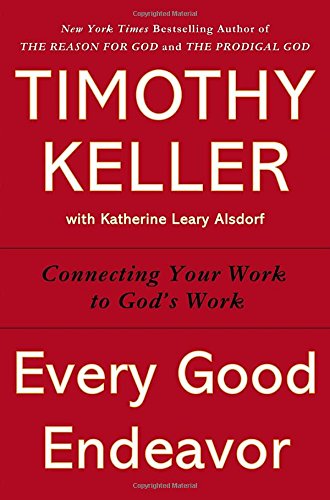A Brief Book Summary from Books At a Glance
By Paul Reese
Overview
This book gives pastoral counsel to help people understand and apply what the Bible says about work. Although many people may consider their vocation nothing more than a job, Keller argues work is a gift used to serve God and others. To understand the purpose of work more biblically, the book is divided into three parts. Part one shows how the Bible reveals God’s plan for work. Part two shows how people’s sinfulness distorts their understanding and practice of work. Part three shows how the gospel redeems work in the life of a Christian with practical examples of how different career fields can apply the gospel to their work. Each part has stories to reinforce Keller’s teaching on the different aspects of how the Bible explains and applies God’s purpose for work.
Work is a calling. Christians must weave faith and work together in the workplace by practicing a worldview that puts God at the center of one’s convictions about work. This happens when Christians understand what God intends work to accomplish. Work should be a way of unlocking creation’s potential, a way of giving people purpose, and a way of promoting human flourishing within society. Accomplishing these purposes occurs when people use their work to serve God and each other. People fail to accomplish these purposes when they use work to sinfully serve themselves. The good news of Christ is that when people repent of sin and believe in Jesus, their convictions about themselves and others change so they begin developing new perspectives about how their work is redeemed by the gospel.
Table of Contents
Part One: God’s Plan for Work
1 The Design of Work
2 The Dignity of Work
3 Work as Cultivation
4 Work as Service
Part Two: Our Problems with Work
5 Work Becomes Fruitless
6 Work Becomes Pointless
7 Work Becomes Selfish
8 Work Reveals Our Idols
Part Three: The Gospel and Work
9 A New Story for Work
10 A New Conception of Work
11 A New Compass for Work
12 New Power for Work
Epilogue: Leading People to Integrate Faith and Work
Summary
Part One: God’s Plan for Work
Chapter 1: God’s Design for Work
God was the first worker at the beginning of all things. Unlike other origin accounts that describe creation as a result of conflict, the Bible describes creation as a result of God’s work being motivated by joy. This is repeated throughout the creation narrative in Genesis as God declares his work good. This principle of work being good is foundational for why Christians should find goodness and freedom in their work.
Because work is not a necessary evil, people should understand God intended work to bless, and not harm, creation. People are built for using work in a way that uniquely blesses the world. The more one discovers the intended goodness of work, the more one realizes how to use their gifts to serve God’s purposes for creation.
Work is conducive to the nature of people, which should create a sense of freedom for people to act in accord with their nature. Like a fish is free to live according to its nature in water and not on land, so people are free to live according to their natures, which is to say, as people who work according to God’s plan as revealed in Scripture. Keller writes, “Freedom is not so much the absence of restrictions as finding the right ones, those that fit with the realities of our own nature and those of the world” (p. 25). The result of this freedom should be human flourishing. Freedom, however, is not without its limitations. Even the best intentions can prioritize work too much.
While work is intended to serve God’s plan for the world, it must not fail to be “subservient to God.” The Christian must cultivate a healthy and intentional relationship between work and rest. Practicing this balance can make work restful.
Chapter 2: The Dignity of Work
The Greeks believed work was demeaning as it kept one from achieving the realm of philosophy, which was considered the “domain of the gods.” Manual labor was demeaning because it was only suited for beasts. Thinking of work as a necessary evil develops an ethic that sees those who exercise their brain (i.e. philosophers) as more important because, in general, work was undervalued.
The undervaluing of work occurs today when work is only as good as the money it makes. When this happens, human dignity becomes a matter. . .
[To continue reading this summary, please see below....]The remainder of this article is premium content. Become a member to continue reading.
Already have an account? Sign In
